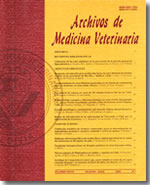Effect of level and type of concentrate supplementation on the performance of spring grazing dairy cows
Main Article Content
Abstract
An experiment to study the effect of the level and type of concentrate supplementation on the performance of dairy cows under a rotational grazing system was carried out over a 68 day period, in spring. Twelve August calving Friesian dairy cows yielding 32.0 lt./day were used. The cows were studied in a 3 x 3 Latin square design, where the factors were; 3 treatments, 3 periods (P1, P2 and P3) and 4 squares. Treatments studied were: T1; only grazing, T2; grazing plus 6 kg/day of a sugar-beet pulp based concentrate, T3; grazing plus 6 kg/day of a cereal-based concentrate. The squares represent the milk yield level of the cows. The treatments were studied with rotations approximately of 23 days with two daily movements. In each period, milk yield was recorded on a daily basis; milk composition once in the last week. Twice a week live weight was recorded throughout the trial. Dry matter yield was estimated weekly, and pasture samples were collected once in the last week of the period.
Average milk yields (29.6, 32.6 and 32.3, s.e.d. = 0.86, for T1, T2 and T3, respectively) and milk protein contents (3.01, 3.00 and 3.10, s.e.d. = 0.031, for T1, T2 and T3, respectively), were significantly affected by concentrate intake, but the increment on protein content was only with cereal-based concentrate. No differences were observed between concentrate supplements for fat and urea content in milk (p >0.05). During the grazing season, average milk yield decreased (32.9, 31.7 and 30.0, s.e.d. = 0.86, for P1, P2 and P3, respectively) and fat content increased (3.5, 3.9 and 4.0, s.e.d. = 0.15, for P1, P2 and P3, respectively), significantly. Protein content and urea content in milk also decreased significantly during the experiment (p <0.05). Live weight gain increased in the same way with the two concentrate supplements (-0.19, 0.51 and 0.69, s.e.d. = 0.280, for T1, T2 and T3, respectively), but it decreased significantly during the experiment (p <0.05). Thus, supplementation with 6 kg of concentrate on grazing dairy cows in spring, increased both milk yield and live weight gains, but no effect due to type of concentrate was detected.

